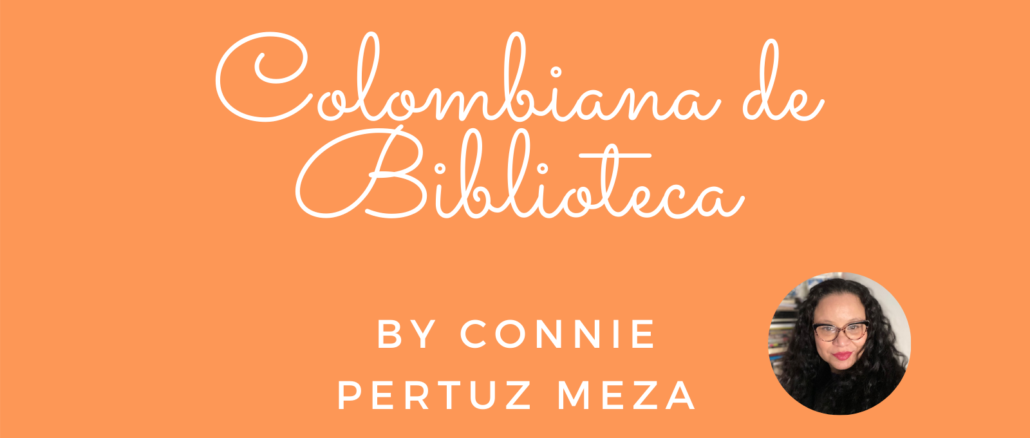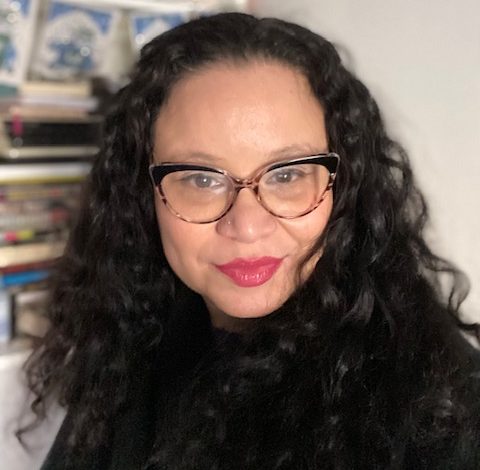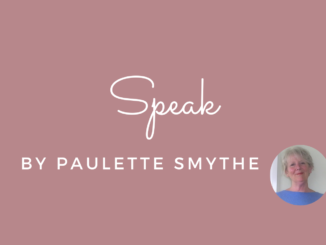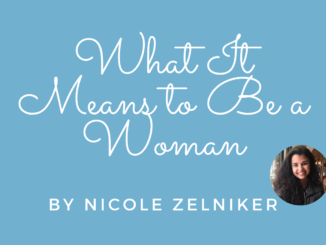
Colombiana de Biblioteca, the first time someone used those words to describe me, I smiled, happy to have my love of learning acknowledged. As the corners of my mouth twitched into a smile, they were brought to a halt by the edge in the person’s voice. Colombiana de Biblioteca, the sharpness of their teeth around the words, baring their resentment. I bit my lip. Shame draped over me. I thought of my American passport and my walks through customs in Barranquilla’s Ernesto Cortissoz and New York City’s John F. Kennedy, and the line I passed through, my sister beside me, and my mother always on the other line. Separated as soon as we showed our passports, Joann and I walked ahead and were welcomed into both countries, while Mami was interrogated for both leaving and entering. Before then I hopped through the worlds of Colombia and the United States, no different than a chalk outline of hopscotch, but it was then, when I first realized those lines drew a hyphen. Colombian-American. Unaware others had labeled me too. Colombiana de Biblioteca.
Everything I know about Colombia I was told, read, experienced too, but with the safety of possessing a blue book with gold block letters embossed on the cover: United States Of America. An American eagle in the center, clutching in one talon an olive branch and in the other, thirteen arrows, and the words, E pluribus unum written in a ribbon right above the head of the eagle, out of many, one. Colombia, too, has a bird as their national symbol, the Andean condor, centered on their warm cafecito brown colored passport. The Andean condor is said to be the largest flying land bird in the world, described as majestic, and like no other. Despite only living in Barranquilla in la costa Atlántico, every other summer of my childhood and for over seven months after graduating college, Colombia was home. Colombia is home.
This was what I thought of days before April 28th when my mother-in-law called in a panic asking my husband to get her a plane ticket back to New York. She had left two weeks before to Colombia excited to spend a month with her two sons, but now she wanted nothing more but to leave home. Seven hours before Colombia descended into El Paro Nacional my mother-in-law landed in John F. Kennedy airport. She shuddered at the chaos, which would be sure to follow, recounting past unrest Colombia lived through, and relieved to be home. My husband bit his nails as he looked into the distance. I thought of the protests which ensued after the murder of George Floyd, while mostly peaceful but at times chaotic and violent, they had brought much needed awareness to police brutality and systemic racism, wouldn’t this be the same? A barrage of images flooded my phone by the next day, tear gas, flash bombs, riot shields, arson fires, military helicopters, and assault rifles, looking more like war than any protests I’ve ever seen.
#
Mami would start to prepare for those summer trips months before we were set to leave, collecting gently used clothes and small gifts, so much so, our living room looked like a cross of a Goodwill and a discount store. Our suitcases bulged like wide hips in too tight jeans as they packed more than just goods to handout to family. We carried atonement in our bags. A gesture, a petition, to make up for the fact that most of our family remained over there — my Colombia homeland — and we did not. As a child I watched my cousins slip into my old uniform plaid jumpers or the discount t-shirts we had purchased in bulk and emblazoned with the previous year World Series winners. They held the tubes of Colgate Mami handed out like bouquets and studied with curiosity the Hawaiian Punch juice boxes we loaded our duffel bags with as treats to offer. Their hands unwrapped clumsily, the straws as they brought the blue boxes to their lips, their heads nodding in jovial unity, despite the pursed lips.
On the cab ride home from JFK, Mami turned to my sister and I. “We go with our bags full and come home nearly empty.” She laughed like a giddy kid.
A lone luggage in the trunk and emaciated duffels on our laps, brick buildings surrounded us as we sped to Brooklyn on the highway, erasing the outlines of las casas color sapote, maracuya, guayaba, and aguacate from Barranquilla. Overcome by a dizzying sensation, as the smell of sweat and sea of La Costa still clung to me, despite the stale air of New York City. I took a deep breath, thinking about how my morning started saying goodbye to el pais de mis padres, and now I was in el pais de otro.
“I only have the clothes I’m wearing.” Mami waved her hands over her long flowered skirt and short sleeve blouse. It was the same she wore going there. Her smile was bigger now.
I looked down at my white sneakers. The one my cousin Patricia asked me for as we were leaving. My stomach clenched, as I thought about the hopefulness in Patricia’s face, shutting my eyes to turn off the memory.
Months later when I outgrew the sneakers I wore them despite the top of the shoe biting my nails, a reminder of not having given them to Patricia. The pain pacified my guilt.
#
Days into the protests I watched videos of Colombia with my hand over my chest, as protestors sang the national anthem, danced traditional cumbia, waved the yellow, blue, and red flag and played the soft sounds of the gaita. Tears streamed down my face as I watched a mother pull at her hair howling as she realized ESMAD, the anti-riot national police, murdered her son. Again I was overcome with a dizzying sensation, wondering how so much disparity can coexist at once. During those first days of the uprising, we heard from family members or heard about the family of friends as they spoke their fears over WhatsApp or Messenger. They spoke in lists: roads blocked, stores ransacked, prices gouged, gas lines protracted, and los gritos de la gente raged.
I stayed up late. I searched network world news, cable news, YouTube, and Google. I needed to know what was happening in Colombia. When I did come across a scrap of news, I spammed my contact list. I needed them to know too. After all, out of many, one. When people say America, most think of North America, forgetting Central America and South America. This was no different. This is no different.
The last few years I learned Colombian history as a way to make sense of who I am, to understand why the adults in my life as a child only spoke of Colombia with the sorrow of nostalgia or the fear born of a violent past. Reading novels by Colombian writers and nonfiction texts, watching documentaries, movies, and novellas, and listening to podcasts I have pieced together a complicated history of a people I cannot quite define. Oppressed but willing to fight for freedom and joy too, inspired to want more for future generations. This majesty exists inside of me too, flying high above me like a condor. In my bones lives the stories of a people who resist and struggle to be heard by their government, by the world. As I define myself, I decided I can be both. I’m defining myself. I choose to be Colombiana. I choose to be Americana.

Connie Pertuz Meza
Connie Pertuz Meza, a Colombian American writer, inspired to pen pieces about her life, family, and ancestors. A NYC public school educator, a mother of two teenagers, daughter of a mother who taught herself to read with a Bible, and a journalist father. Connie’s writing appeared in The Rumpus, Kweli Literary Journal, Lunch Ticket, Women Who Roar, Herstryblg, Intervenxtions NYU Latinx Project, Raising Mothers, Dreamers Creative Writing, Voices In The Middle, The Acentos Review, MUTHA, and several anthologies. A forthcoming multicultural picture book with Scholastic 2022. Connie is a three-time VONA alum and board member, a Tin House participant, and 2021 Kweli emerging writer fellow. Connie is working on a semi-autobiographical YA novel, and guest writer for Hispanecdotes and Epifania Magazine.


